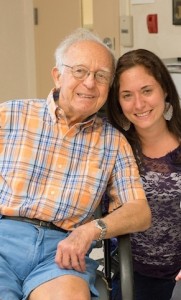by Ela Schwartz
Taylor Herbert, M.S.W. ’07, LMSW, always knew she wanted to help people. She just wasn’t sure what population she wanted to serve as a social worker.
Intrigued by the growing need for social workers to help older adults, Ms. Herbert decided, in her final year of graduate school, to participate in a new program at the Adelphi University School of Social Work: the Hartford Partnership Program for Aging Education (HPPAE).
After her field placements, including one at the Sid Jacobson Jewish Community Center (SJJCC), she knew she’d found her niche. The SJJCC hired her right after graduation, and today she is the director of specialized senior services. Her role is to direct programs for seniors who are frail and/or at various stages of memory impairment, as well as a one-of-a-kind program for clients in their 30s through 50s with young-onset dementia. The SJJCC has also hired two Adelphi graduates straight out of HPPAE.
Philip Rozario, Ph.D, director of the Adelphi University School of Social Work Ph.D. programand an expert on gerontological social work, pointed out that “There is a serious shortage of trained professionals to deal with a growing aging population. At Adelphi, graduate students can lead the way in this expanding field.”
According to government statistics, employment of healthcare social workers, which includes those working with the geriatric population, is projected to grow 27 percent from 2012 to 2022—much faster than the average for all occupations, due to the aging of the baby boomers. Adults aged 90 and above are the fastest-growing demographic—nearly tripling over the past three decades and projected to more than quadruple over the next 40 years.
Dr. Rozario explained that any social work specialization has an elderly component. Older adults contend with addictions, AIDS and mental illness. They may have custody of a child through the foster care system, or be veterans, as Amanda Cruz ’13, M.S.W. ’14, experienced.
Ms. Cruz originally thought her social work calling was working with children. She decided to participate in HPPAE to “diversify my résumé,” as she put it. Her field placement was in the lock-down unit of a nursing home for veterans ages 60–95 contending with post-traumatic stress disorder (PTSD) and other mental illnesses and behavioral problems. She oversaw a caseload of “eight different people—‘different’ being the key word,” as she put it.
And she said she’s thoroughly enjoyed the experience, enough to decide to change her career choice to geriatric social work.
She praises the instruction she received in HPPAE about the aging process, legal matters such as wills, power of attorney and advance directives, and her continuing education classes, admitting, “All my classes were so meaningful and practical in my internship.”
Part of her internship included a needs-assessment project she completed with a fellow intern on conflict resolution among the veteran residents. The result was the formation of a group in which members learn social skills, a group that has continued even after Ms. Cruz’s internship ended.
For the future, “I’m going to stick with the geriatric population,” she said. “I enjoy being there for them, learning their histories, how life was different then from now, what they’ve seen and what they need to put to rest.”
Ms. Herbert has no regrets about her choice to work with older adults. “I can’t believe I get paid to do this,” she said. “I love seeing seniors, who were unhappy when they got off the bus, go home with huge smiles on their faces. HPPAE was a fabulous opportunity. It got me where I am today. I would absolutely—100 times over—do it again.”

In 2013, Amanda Cruz ’13, M.S.W. ’14 (far right), and fellow Adelphi students participated in a Youth Service Opportunities project in Washington, D.C., where they worked with this senior citizen through the Age-in-Place, Seabury Resources for Aging program.
